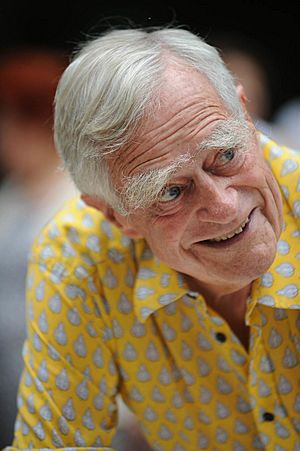Luc Hoffmann facts for kids
Quick facts for kids
Luc Hoffmann
|
|
|---|---|

Hoffmann in 2009
|
|
| Born |
Hans Lukas Hoffmann
23 January 1923 Basel, Switzerland
|
| Died | 21 July 2016 (aged 93) Camargue, France
|
| Occupation | Ornithologist, conservationist, philanthropist |
| Known for | Co-founder and first president of the WWF International |
| Spouse(s) | Daria Razumovsky |
| Children | 4, including André Hoffmann, Vera Michalski and Maja Hoffmann |
| Relatives | Fritz Hoffmann-La Roche (grandfather) |
Hans Lukas "Luc" Hoffmann (born January 23, 1923 – died July 21, 2016) was a Swiss expert on birds, a nature protector, and a generous giver. He helped start the World Wide Fund for Nature (WWF). This is a big group that works to protect animals and nature. He also helped create the Ramsar Convention. This important agreement helps protect wetlands around the world. Luc Hoffmann also set up a research center called Tour du Valat in France. In 2012, his MAVA Foundation and WWF started the Luc Hoffmann Institute. He wrote over 60 books, mostly about birds.
Contents
Early Life and Education
Luc Hoffmann was born in Basel, Switzerland. He was the second son of Emanuel Hoffmann, a businessman and art lover. His mother, Maja Hoffmann-Stehlin, was a sculptor. When Luc was nine, his father died in a car crash. The next year, his older brother died from an illness. His mother later married the composer Paul Sacher. Even though his family was very rich, Luc grew up without a lot of fancy things.
Discovering a Love for Nature
Luc loved nature from a young age. He spent much of his free time bird watching near Basel. When he was still in school, he wrote his first science paper. It was about seabirds passing through the Basel area. This paper was published in a bird observer magazine in 1941.
In 1941, he started studying plants and animals at the University of Basel. In 1943, he joined the Swiss Army. After World War II, Hoffmann did more science research. He earned a PhD for his work on baby common terns. He studied their different color patterns in the Camargue area of France.
Protecting Nature: Luc Hoffmann's Work
Luc Hoffmann dedicated his life to protecting the natural world. He made many important contributions to conservation.
Tour du Valat Research Center
In 1947, Hoffmann bought land in the Camargue region of France. In 1954, he opened the Tour du Valat biological research station there. This center has done amazing work. For example, the large pink birds called greater flamingos are still found in France because of the work at Tour du Valat. Hoffmann also helped breed Przewalski's horses nearby. These rare horses were later sent back to their native home in Mongolia in 2004. Many scientists have trained at Tour du Valat over the years.
Founding the World Wildlife Fund (WWF)
In 1961, Luc Hoffmann helped create the World Wildlife Fund (WWF). He worked with other famous conservationists like Peter Scott. WWF is one of the largest conservation groups in the world. Its goal is to stop the destruction of nature and protect wildlife. Hoffmann was a vice-president of WWF until 1988. He also helped create the Doñana National Park in Spain in 1963.
The Ramsar Convention
Hoffmann was a key person in starting the Ramsar Convention. This was one of the first international agreements to protect the environment. The convention focuses on saving wetlands. Wetlands are areas of land covered by shallow water. They are very important homes for many animals, especially migratory birds. The Ramsar Convention was created in 1971 and started in 1975. Today, over 160 countries have agreed to protect their wetlands under this convention.
MAVA Foundation and Luc Hoffmann Institute
In 1994, Hoffmann started the MAVA Foundation. This foundation gives money to projects that protect nature. It helps areas like the Mediterranean Sea, the west coast of Africa, and the Alps mountains. In 2012, the MAVA Foundation and WWF International created the Luc Hoffmann Institute. This institute works to find new scientific ideas to solve tough problems in nature conservation.
Other Conservation Efforts
Luc Hoffmann also helped protect nature in many other places. These include:
- The Neusiedler See in Austria.
- The Hortobágy National Park in Hungary.
- The Prespa region where Greece, Albania, and Macedonia meet.
- The Banc d'Arguin National Park in Mauritania.
In 2003, a special gift was made to honor Hoffmann's 80th birthday. This led to the creation of the Luc Hoffmann Chair in Field Ornithology at Oxford University. This position helps teach and research about birds.
Awards and Recognition
Luc Hoffmann received many awards for his important work:
- Honorary Doctorate from the University of Basel (2001)
- Euronature-Environmental Prize (2007)
- Fellow of the American Association for the Advancement of Science (1973)
- Chevalier of the National Order of the Légion d'honneur (1989)
- Duke of Edinburgh Conservation Medal from the World Wide Fund for Nature (1998)
- John C Phillips Medal from the International Union for Conservation of Nature (2004)
- Honorary Doctorate Degree from Business School Lausanne (2013)
Family Life
Luc Hoffmann's grandfather, Fritz Hoffmann-La Roche, started the company Hoffmann-La Roche in 1896. This company is now a very large pharmaceutical company. Luc's family still owns most of it. He used his family's wealth to fund the MAVA Foundation. This foundation supports nature protection projects all over the world.
In 1953, Luc Hoffmann married Daria Razumovsky in Vienna. They had four children together: Vera, Maja, André, and Daschenka. His son, André Hoffmann, continues his father's legacy. He serves on the Advisory Board of the Luc Hoffmann Institute.
See also
 In Spanish: Luc Hoffmann para niños
In Spanish: Luc Hoffmann para niños
 | Sharif Bey |
 | Hale Woodruff |
 | Richmond Barthé |
 | Purvis Young |

